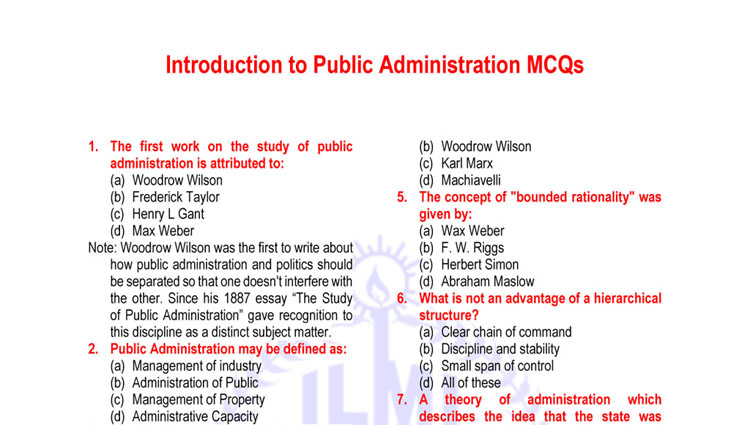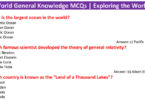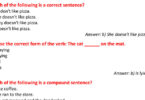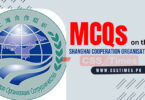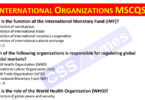The first work on the study of public administration is attributed to:
(a) Woodrow Wilson
(b) Frederick Taylor
(c) Henry L Gant
(d) Max Weber
Answer: a
Note: Woodrow Wilson was the first to write about how public administration and politics should be separated so that one doesn’t interfere with the other. Since his 1887 essay “The Study of Public Administration” gave recognition to this discipline as a distinct subject matter.
Public Administration may be defined as:
(a) Management of industry
(b) Administration of Public
(c) Management of Property
(d) Administrative Capacity
Answer: b
Note: Woodrow Wilson defined public administration as a detailed and systematic execution of public law, he divided government institutions into two separate sectors, administration and politics.
The study of government decision making, the analysis of the policies themselves, the various inputs that have produced them, and the inputs necessary to produce alternative policies is called
(a) Administration of Authority
(b) Public administration
(c) Property administration
(d) Administrative Capacity
Answer: b
Note: The management of public programs is called Public administration.
The “translation of politics into the reality that citizens see every day” is called Public administration.
The concept of “separation between politics and public administration” was first propounded by:
(a) Aristotle
(b) Woodrow Wilson
(c) Karl Marx
(d) Machiavelli
Answer: b
The concept of “bounded rationality” was given by:
(a) Wax Weber
(b) F. W. Riggs
(c) Herbert Simon
(d) Abraham Maslow
Answer: c
What is not an advantage of a hierarchical structure?
(a) Clear chain of command
(b) Discipline and stability
(c) Small span of control
(d) All of these
Answer: d
A theory of administration which describes the idea that the state was created by “man” to serve the people and act in their interests is called:
(a) Historical Theory
(b) Locational Theory
(c) Mechanistic Theory
(d) Human Relations Theory
Answer: c
In which year civil services started in India?
(a) 1901
(b) 1861
(c) 1851
(d) 1832
Answer: B
Which country started civil service competition first?
(a) USA
(b) British India
(c) China
(d) Germany
Answer: c
Which of the following is one of the features of bureaucracy conceived by Max Weber?
(a) Administrative Authority
(b) Hierarchy
(c) Public Policy
(d) Civil society
Answer: b
Note: Maximilian Karl Emil Weber was a German sociologist, philosopher, jurist, and political economist. His ideas profoundly influenced social theory and social research. Weber is often cited, with Émile Durkheim and Karl Marx, as among the three founders of sociology.
Indian Civil Service was introduced during the Governor General-ship of: (CSS 2019)
(a) William Bentinck
(b) Lord Curzon
(c) Lord Dalhousie
(d) Lord Cornwallis
Answer: d
Note: Civil service Charles Cornwallis reformed, modernised and rationalised it. Hence, Charles Cornwallis is known as the ‘Father of Civil Service in India’. He introduced Covenanted Civil Services (Higher Civil Services) and Un-covenanted Civil Services (Lower Civil Services).
Who was the first Indian to be directly recruited to the Indian Civil Service?
(a) Satyendra Nath Tagore
(b) Surendranath Bannerjea
(c) Womesh Chandra Bannerjea
(d) Dadabhai Naoroji
Answer: a
Note: Satyendranath was selected for the Indian Civil Service in June, 1863. He completed his probationary training and returned to India in November 1864.
McGregor’s name is most commonly associated with one of the following:
(a) Bureaucratic Theory
(b) Scientific Management
(c) Theory X and theory Y
(d) Human Relations
Answer: c
Legal-rational authority” is a core concept of:
(a) Public Choice Theory
(b) Theory of Emergency
(c) Maslow’s Theory of Motivation
(d) Theory of Bureaucracy
Answer: d
The ‘spoils system’ in the USA began during the period of:
(a) Jefferson
(b) Jackson
(c) Washington
(d) Adams
Answer: b
“Entropy” is a law of nature in which all forms of organizations move towards:
(a) Growth and Continuity
(d) Continuous Improvement
(c) Rebirth and Emergency
(d) Disorganization and Death
Answer: d
One choice theory is economic explanation of:
(a) Religion
(b) Islam.
(c) Political decision making
(d) Psychology
Answer: d
System Theory is associated with the work of following:
(a) Leonard While
(b) Mary Parker Follet
(c) Talcott Parsons
(d) F.W. Taylor
Answer: c
Which one of the following is the foundation of modern Human Resource?
(a) Specialization
(b) Compensation
(c) Job Analysis
(d) Job Evaluation
Answer: a
Who is described as the father of Public Administration?
(a) Woodrow Wilson
(b) Frederick Taylor
(c) Henry L Gant
(d) Max Weber
Answer: a
Note: He is described as the father of Public Administration in the US because he was the first to write about how public administration and politics should be separated so that one doesn’t interfere with the other. Since his 1887 essay “The Study of Public Administration” gave recognition to this discipline as a distinct subject matter.
Who is famous as the mother of modern management?
(a) Marya Kate
(b) Lillian Gilbreth
(c) Katherine Smith
(d) None of these
Answer: b
Note: She was the mother of modern management. Together with her husband Frank, she pioneered industrial management techniques still in use today. She was one of the first “superwomen” to combine a career with her home life.
Who is claimed to be the real father of modern management?
(a) Woodrow Wilson
(b) Frederick Taylor
(c) Henri Fayol
(d) Max Weber
Answer: c
Note: He is claimed to be the real father of modern management. He was a Frenchman born in 1841 and was working as an engineer with a mining company. He improved the condition of the company from virtual bankruptcy to high success. From his practical experience, he developed some techniques. He brought out some 14 basic management principles, which he felt, could be used in all management situations, irrespective of the organizational framework.
He wrote a book entitled, General and industrial Management, in French that was later on translated into English. It is now considered as one of the classics of management literature. He also laid down the principles of management, which he deemed important for any organization.
Which of the following is a feature of good governance?
(a) Accountability
(b) Transparency
(c) Rule of law
(d) All of these
Answer: d
An organization which successfully achieve the goals will be considered as:
(a) Efficient
(b) Systemic
(c) Effective
(d) Reasonable
Answer: C
An organization using its resources wisely and in a cost effectively way is considered:
(a) Conservative
(b) Modern
(c) Effective
(d) Efficient
Answer: d
Grouping activities and resources in an organization is a function of:
(a) Leading
(b) Organizing
(c) Coordination
(d) Monitoring
Answer: b
The dominant role in developing Scientific Management was played by:
(a) Henri Fayol
(b) F. W. Taylor
(c) Harrington Emerson
(d) Frank Gilbreth
Answer: b
The most articulate spokesperson of Administrative Management was:
(a) Chester Barnard
(b) Max Weber
(c) Lyndall Urwick
(d) Henri Fayol
Answer: d
Hawthrone studies were mainly conducted by:
(a) Elton Mayo
(b) Mary Parker
(c) Hugo Munsterberg
(d) Henry Gantt
Answer: a
Two or more sub systems working together to produce more than the total of what they might produce working alone is
(a) Open System
(b) Closed System
(c) Sub System
(d) Synergy
Answer: d
An attempt to integrate common business practices from the United States and Japan into one middle ground framework has been termed as:
(a) Theory X
(b) Theory Y
(c) Type Z Model
(d) Universal Model
Answer: d
The owners, Employees, Board or Directors and Culture will form the organization’s:
(a) Internal Environment
(b) External Environment
(c) Task Environment
(d) General Environment
Answer: b
The appropriate managerial behavior in a given situation depends on a wide variety of elements is:
(a) Classical Approach
(b) Quantitative Approach
(c) Behavioral Approach
(d) Contingency Approach
Answer: d
The founder of Scientific Management School of thought was:
(a) F.W. Taylor
(b) Herber Simon
(c) Pfiffner John
(d) Mary Parker Follet
Answer: a
Note: The founding father of scientific management theory is Frederick W. Taylor (1856-1915). He was an American inventor and engineer. His two most important works were Shop Management (1903) and The Principles of Scientific Management (1911).
The father of Human Relations theory was:
(a) Douglas M.
(b) Elton Mayo
(c) E.N.Gladden
(d) L. Urwick
Answer: b
What is the personnel department in an organization concerned with?
(a) Staff development
(b) Staff attraction
(c) Staff administration
(d) Staff rewards
Answer: c
Systems theory of management is based on the concept of components having:
(a) Independence
(b) Inter- dependence
(c) Dependence
(d) Contingency
Answer: b
What is OD?
(a) Organizational development
(b) Organizational disputes
(c) Organizational demands
(d) Organizational drift
Answer: a
Administrative accountability is established in government organizations by:
(a) Executive
(b) Legislature
(c) Judiciary
(d) All the these
Answer: d
The first book on Public Administration was written by:
(a) Pfiffner and Presthus
(b) L. D. White
(c) Simon, Smithburg and Thompson
(d) E.N. Gladden
Answer: b
Public Administration is the study of:
(a) Maintenance of Law and Order
(b) Control of trade and commerce
(c) Public Policy implementation
(d) Politico-administrative dynamics of the state.
Answer: c
Planning machinery in Pakistan is:
(a) Centralized
(b) Decentralized
(c) Departmentalized
(d) Compartmentalized
Answer: a
Financially the performance of public corporations in Pakistan during the last decade has been:
(a) Excellent
(b) Good
(c) Satisfactory
(d) Poor
Answer: d
Public administration refers to:
(a) A process
(b) A discipline
(c) A field of study
(d) All of these
Answer: d
Communication runs faster in:
(a) Centralized structure
(b) Decentralized structure
(c) Matrix structure
(d) Line structure
Answer: a
Performance budgeting is based on:
(a) items of expenditure
(b) items of investment
(c) objectives of expenditure
(d) plan of implementation
Answer: c
The concept of Politics-Administration dichotomy was given by:
(a) Frank Henry Goodnow
(b) James W. Fes1er
(c) W Paul Appleby
(d) Ordway Tead
Note: Frank Johnson Goodnow (January 18, 1859 – November 15, 1939) was an American educator and legal scholar, born in Brooklyn, New York.
Answer: a
Which of the following reports deals with the relations between the specialists and generalists?
(a) Fulton Committee Report
(b) Kothari Committee Report
(c) Haldane Committee Report
(d) Sarkaria Commission Report
Answer: a
The President of U. S. who laid the foundation of the study of public administration was:
(a) President Wilson
(b) President Hoover
(c) President Kennedy
(d) President Roosevelt
Answer: a
Formal relationship in an organization is based on:
(a) Friendship
(b) Peer groups
(c) Authority on subordinates
(d) Rules and Regulations
Answer: d
Before you leave check other collections of MCQs for CSS/PMS/PCS
- Test Your Knowledge: English Grammar MCQs
- World General Knowledge MCQs | Exploring the World
- English Grammar MCQs: Test Your Language Skills with 50 Questions
- MCQs on the Shanghai Cooperation Organisation (SCO)
- International Organizations MCQs | General Knowledge MCQs
- Everyday Science MCQs | Food Science MCQs
- Islamic Studies MCQs (Set-I)
- International Relations MCQs (International political community Se-II)
- 200+ World General Knowledge MCQs
- Random General Knowledge Questions [Set-1]

